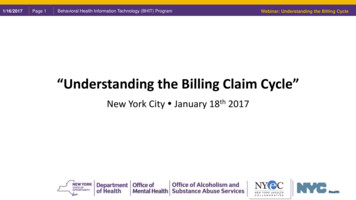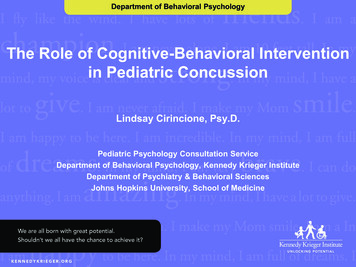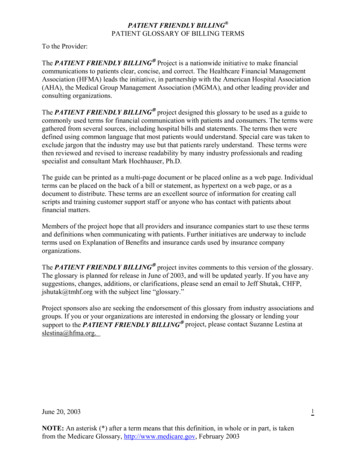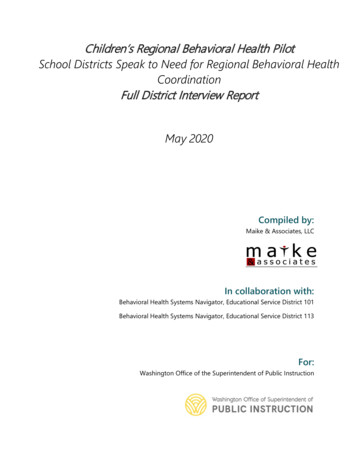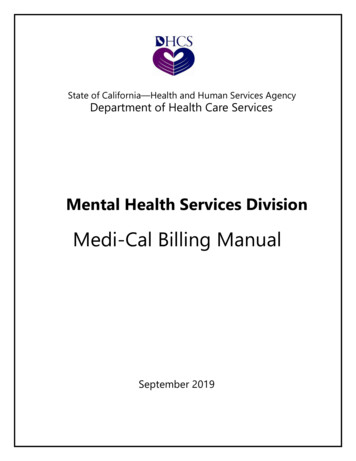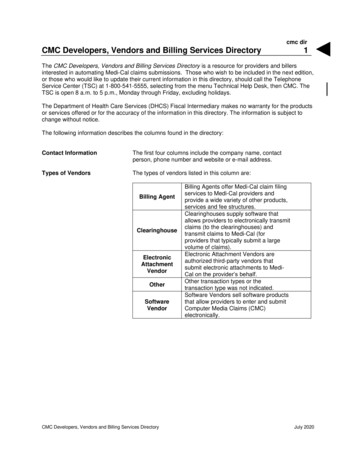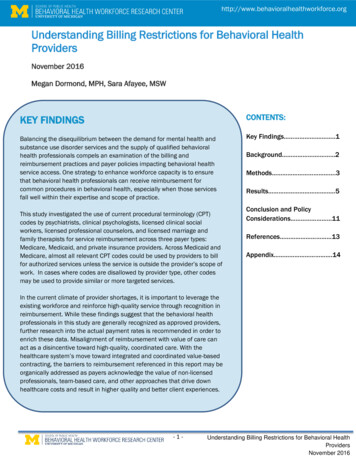
Transcription
ing Billing Restrictions for Behavioral HealthProvidersNovember 2016Megan Dormond, MPH, Sara Afayee, MSWKEY FINDINGSCONTENTS:Balancing the disequilibrium between the demand for mental health andsubstance use disorder services and the supply of qualified behavioralhealth professionals compels an examination of the billing andreimbursement practices and payer policies impacting behavioral healthservice access. One strategy to enhance workforce capacity is to ensurethat behavioral health professionals can receive reimbursement forcommon procedures in behavioral health, especially when those servicesfall well within their expertise and scope of practice.Key Findings . .1This study investigated the use of current procedural terminology (CPT)codes by psychiatrists, clinical psychologists, licensed clinical socialworkers, licensed professional counselors, and licensed marriage andfamily therapists for service reimbursement across three payer types:Medicare, Medicaid, and private insurance providers. Across Medicaid andMedicare, almost all relevant CPT codes could be used by providers to billfor authorized services unless the service is outside the provider’s scope ofwork. In cases where codes are disallowed by provider type, other codesmay be used to provide similar or more targeted services.Background . .2Methods .3Results . . 5Conclusion and PolicyConsiderations .11References 13Appendix .14In the current climate of provider shortages, it is important to leverage theexisting workforce and reinforce high-quality service through recognition inreimbursement. While these findings suggest that the behavioral healthprofessionals in this study are generally recognized as approved providers,further research into the actual payment rates is recommended in order toenrich these data. Misalignment of reimbursement with value of care canact as a disincentive toward high-quality, coordinated care. With thehealthcare system’s move toward integrated and coordinated value-basedcontracting, the barriers to reimbursement referenced in this report may beorganically addressed as payers acknowledge the value of non-licensedprofessionals, team-based care, and other approaches that drive downhealthcare costs and result in higher quality and better client experiences.-1-Understanding Billing Restrictions for Behavioral HealthProvidersNovember 2016
BACKGROUNDMillions of Americans are affected by mental health and/or substance use disorders (SUD), equating tonearly 1 in 5 Americans living with a behavioral health condition in a given year. 1 Additionally,approximately 1 in 25 adults experience a serious mental illness that substantially interferes with or limitsone or more major life activities.2 Meanwhile, the Health Resources and Services Administration (HRSA)reports that more 7,800 mental health professionals are needed to address the lack of behavioral healthservices in the nearly 3,700 workforce shortage areas throughout the country.3 Inadequate access tobehavioral health services has the potential to cause great personal and economic challenges.Since the 1970s efforts have been made to deal with the workforce issues regarding mental andsubstance use disorders, but a 2006 Institute of Medicine (IOM) report notes that most initiatives have notbeen sustained long enough or been comprehensive enough to remedy the problems.4 In 2013 theSubstance Abuse and Mental Health Services Administration (SAMHSA) reported to Congress that,“recruitment and retention efforts are hampered by inadequate compensation, which discourages manyfrom entering the field”.3The payment, reimbursement, and billing issues around behavioral health are substantial. Psychiatry wasnot considered insurable until 30 years ago, and limitations exist related to reimbursement forpsychotherapy. In March of 2010 the Affordable Care Act (ACA) was signed into law, and this in conjunctionwith the Mental Health Parity and Addiction Equality Act (MHPAEA) of 2008 has expanded behavioralhealth benefits to approximately 60 million Americans.5Both the ACA and MHPAEA require health insurers and group health plans to provide the same level ofbenefits for behavioral health services that they do for primary care services. This increase in coverageleads to a discussion around the capacity of the behavioral health workforce to provide services to newlycovered individuals. Research into the size and scope of the available behavioral health workforce iscomplemented by an understanding of the opportunities and barriers that exist related to reimbursement.In the United States, there are three major payers that reimburse for behavioral health services: Medicare,Medicaid and commercial health insurers.Medicaid is the single largest payer for mental health services and plays a significant role in financingsubstance use disorder services.6 States have Medicaid medical assistance plans that outline eligibilityand covered services, as well as provide guidelines for how States reimburse for services. States have-2-Understanding Billing Restrictions for Behavioral HealthProvidersNovember 2016
significant flexibility within the Medicaid program to provide behavioral health services within their deliverysystem, whereas Medicare reimbursement policies are standard from state to state because it is anational program.Current procedural terminology (CPT) codes are used to report medical, surgical, and diagnosticprocedures and services to payers. This system offers providers across the country a uniform process forcoding medical services to streamline reporting. The American Medical Association (AMA) maintains thecurrent guidelines for CPT codes, and updates the codes as necessary. The Centers for Medicare &Medicaid Services (CMS) also developed a set of medical reporting codes. The Healthcare CommonProcedure Coding System (HCPCS) codes are based upon CPT codes. Coders use HCPCS codes to reportmedical procedures to Medicare, Medicaid, and several other third-party payers. HCPCS codes are dividedinto three levels: Level I is identical to CPT codes; Level II codes represent non-physician services; andLevel III codes represent services that are not included in HCPCS Levels I and II. Level III codes weredeveloped by state Medicaid agencies, Medicare contractors, and private insurers. They are typically usedlocally and are not nationally recognized. Both HCPCS and CPT codes have guidelines for use, whichoutline the eligible providers that can bill for a specific service. Due to the variability of HCPCS codesacross jurisdictions this research focuses on CPT codes, which are analogous to Level I HCPCS codes.One strategy to enhance access to behavioral health services is to ensure that behavioral healthprofessionals can receive reimbursement for common procedures, especially when those services fall wellwithin their scope of practice. For this study, the National Council for Behavioral Health (National Council)identified several common CPT codes and investigated the reimbursement policies associated with thesecodes. This research will enhance our understanding of the behavioral health workforce by documentingon a state by state level which types of behavioral health practitioners can be reimbursed for what kinds ofservices, and which services are allowable under the state scope of practice but restricted due toreimbursement policy. This report examines the extent to which behavioral health professionals arerecognized as reimbursable providers for common billing codes that fall within their scopes of practice.METHODSThe National Council identified eight CPT codes that are the commonly used by behavioral healthorganizations, and are representative of the broadest scopes of practice for mental health and SUDproviders (i.e., behavioral health providers):-3-Understanding Billing Restrictions for Behavioral HealthProvidersNovember 2016
Table 1. Current Procedural Terminology Codes Used in Study90791Psychiatric Diagnosis Evaluation without Medical Services90792Psychiatric Diagnosis Evaluation with Medical Services90832Psychotherapy, 30 Minutes90846/7 Family or Couples Psychotherapy with/without Patient90839Psychotherapy for Crisis90853Group Psychotherapy90863Pharmacological ManagementTo investigate both the impact of behavioral health organizations’ billing and reimbursement practices,and restrictions enforced by various payers, the National Council conducted a state by state analysis ofregulations for each identified CPT code for Medicaid and Medicare. Sources included the official Medicarewebsite, internet-based Medicaid billing manuals, billing worksheets from the SAMHSA-HRSA Center forIntegrated Health Solutions (CIHS) website, and documents obtained during outreach to state Medicaidoffices. Data was first obtained from the SAMHSA-HRSA CIHSBehavioral Health ProvidersIncluded in this Study:1. Psychiatrist2. Clinical Psychologist3. Licensed Clinical Social Workers(LCSWs)4. Licensed professionalcounselors (LPCs)5. Licensed marriage and familytherapists (LMFTs)billing worksheets produced in 2012. To address any changesthat may have been made to state Medicaid plans or CPTcodes, researchers also followed up individually with eachstate Medicaid office to obtain information from the mostrecently available Medicaid billing manual.Regulations were analyzed for the following five types ofbehavioralhealthcare providers: psychiatrists, clinicalpsychologists, licensed clinical social workers, licensed professional counselors, and licensed marriageand family therapists, which were selected for inclusion based on the information highlighted in theliterature and reimbursement policies. Reimbursement restrictions were noted as it related to setting,required supervision, and allowable number of encounters/services, among others. Two health caresettings were included in this research: community health centers and community mental health centers.Ten states (Arizona, Georgia, Indiana, Kansas, Louisiana, New Hampshire, Ohio, Oregon, Washington, andWisconsin) were selected for more in-depth research. The selection process intentionally identified adiverse geographic and political sample, which is representative of the broad diversity of America’s payerlandscape. This included ensuring that both Medicaid expansion and non-expansion states were-4-Understanding Billing Restrictions for Behavioral HealthProvidersNovember 2016
represented. Researchers attempted to collect data from 6 commercial insurance providers (i.e., privateinsurance companies) in selected states through online research and telephone survey.To corroborate and illuminate these findings further, the National Council conducted key informantinterviews with leaders from 12 organizations across six of the ten states selected for further research.Interview themes included utilization of the common behavioral health focused billing codes. Respondentswere asked to describe their organization in terms of geographic location, size of population served, andprovider breakdown. The interview protocol went through each CPT code of interest and asked questionsabout utilization, eligible providers, and barriers.Key informant interviewees were based in Georgia (2), Louisiana (1), Washington (3), Indiana (3), Arizona(1), and New Hampshire (2), and were recruited from the National Council’s network of more than 2,800community behavioral health organizations. Interview protocols were developed in collaboration with theBehavioral Health Workforce Research Center at the University of Michigan School of Public Health. Thisstudy was reviewed by the Institutional Review Board at the University of Michigan and deemed exemptfrom ongoing review.RESULTSThe findings of this study show that psychiatrists, clinical psychologists, and licensed clinical socialworkers are recognized as core behavioral health professionals by both Medicare and Medicaid. In themajority of states, most of the five types of behavioral health care providers selected for this research wererecognized for Medicaid reimbursement by the codes under consideration. Per Medicare policies,psychiatrists, clinical psychologists, and licensed clinical social workers could be reimbursed for all eight ofthe CPT codes of interest. However, unlike the majority of Medicaid plans, licensed marriage and familytherapists and licensed professional counselors cannot be reimbursed by Medicare. Full analyses onMedicare and state-by-state Medicaid findings appear in the Appendix.Analysis of Payers: Medicare and MedicaidPsychiatrists, clinical psychologists, and licensed clinical social workers are recognized by Medicare toprovide behavioral health services. All three of these providers can bill to all the codes in question with theexception of CPT code 90792 (psychiatric evaluation with medical services), which is reserved for medicalproviders, and as such only psychiatrists are eligible.-5-Understanding Billing Restrictions for Behavioral HealthProvidersNovember 2016
While Medicare billing process and procedures are consistent nationwide, Medicaid benefits vary fromstate to state. This can be seen most apparently with CPT code 90792 (psychiatric evaluation with medicalservices). Across all 50 states and the District of Columbia, psychiatrists can be reimbursed for 90792(psychiatric evaluation with medical services), however the regulations for clinical psychologists andlicensed clinical social workers vary from state to state and also from setting to setting based on scope ofpractice and local Medicaid policies.The most variability among eligible provider types within Medicaid occurred with codes 90846 and 90847(family or couples therapy with/ without patient). California, Illinois, South Dakota, and Texas did notreimburse for 90846 at all, while South Carolina and Wyoming allowed only clinical psychologists orpsychiatrists to be reimbursed. A state Medicaid plan not recognizing 90846 does not mean they do notcover the service; rather, it may be covered by a specific local HCPCS code. Whereas South Dakota, andTexas did not recognize 90846 they did recognize 90847 for some providers. In South Dakotapsychiatrists, clinical psychologists, and licensed clinical social workers, and in Texas licensed clinicalsocial workers, licensed professional counselors, and licensed marriage and family therapists were eligibleto be reimbursed.Clinical psychologists, a ubiquitous behavioral health provider, are ineligible for 90791 (PsychiatricDiagnosis Evaluation without Medical Services) in the following states: Alaska, California, Iowa, Michigan,Massachusetts, North Dakota, Ohio, Virginia, and Vermont. In all of these states 90791 was covered by apsychiatrist or other medical provider.Florida and Mississippi both used H-2011 (HCPCS Code) instead of 90839 (psychotherapy for crisis) toreimburse for psychotherapy for crisis. The use of this H code could be due to a better reimbursement rate,or the avoidance of pre-authorizations for providing crisis services. This finding was corroborated by aninterviewee in Louisiana where providers opted to use the H code to avoid the preauthorization necessary90839 (psychotherapy for crisis).Other notable exceptions at the state level were found for Pennsylvania, South Carolina, South Dakota,West Virginia, and Wyoming; all of which excluded licensed clinical social workers, licensed professionalcounselors, licensed marriage and family therapists from most or all of the listed billing codes. In Missouri,licensed clinical social workers and licensed professional counselors were restricted to serving clientsunder the age of 21 for all but 90846 (family or couples therapy with patient). Additionally, 90863-6-Understanding Billing Restrictions for Behavioral HealthProvidersNovember 2016
(pharmacological management) is only used in Louisiana and New Mexico by clinical psychologists whohave prescribing rights when done in conjunction with psychotherapy.Analysis by Service and Billing CodeService Setting Variability within MedicaidThe codes 90791, 90792, and 90832 were selected for further study into service setting because theyare the most commonly used CPT codes out of the eight selected for this study. It is important tounderstand the variability between service settings when related to billing restrictions, as behavioral healthconsumers may access services in either a primary care or specialty care location. Community healthcenters, for the purpose of this research, were analogous to federally qualified health centers. Communityhealth centers either directly or indirectly provide primary health services and related services to residentsof a defined geographic area that is underserved. There is no standard definition for a communitybehavioral health organization, however they are typically described as organizations that providebehavioral health services to underserved communities.Psychiatric Diagnosis Evaluation without Medical ServicesIt was common for psychiatrists to be eligible for reimbursement across both settings (41 states), howevermore community mental health centers than community health centers allowed these providers to bereimbursed (9 vs. 1, respectively). Community mental health centers were more likely to allow clinicalpsychologists and licensed clinical social workers to bill code 90791- psychiatric evaluation withoutmedical services- as opposed to community mental health centers where only select states allowed clinicalpsychologists to be reimbursed (Figure 1). Licensed professional counselors and licensed marriage andfamily therapists were not recognized by many state Medicaid plans for reimburses, however where theywere eligible for reimbursement it was usually at a community mental health center (Figure 1).Psychiatric Diagnosis Evaluation with Medical ServicesAcross all 50 states and the District of Columbia psychiatrists were eligible under 90792, psychiatricdiagnosis evaluation with medical services (Figure 2). This is important to note, as 90792 involves medicalservices and is typically reserved for providers with a medical degree. In some states, non-medicalproviders are able to utilize 90792 by providing described services outside of the medical care. In othercases, states defer to 90791 as the primary diagnostic code without medical services. Several statesrecognized clinical psychologists, and even a few recognized licensed clinical social workers, licensedprofessional counselors, and licensed marriage and family therapists (Figure 2).-7-Understanding Billing Restrictions for Behavioral HealthProvidersNovember 2016
Figure 1. Medicaid Eligible Provider Types for Psychiatric Diagnosis Evaluation without Medical Servicesacross Service Settings60Number of States50403020100PsychiatristClinical PsychologistBoth SettingsLicensed Clinical Social Licensed ProfessionalWorkerCounselorCommunity Health CenterLicensed Marriage andFamily TherapistCommunity Mental Health CenterNote: Refers to CPT Code 90791Figure 2. Medicaid Eligible Provider Types for Psychiatric Diagnosis Evaluation with Medical Servicesacross Service Settings60Number of States50403020100PsychiatristClinical PsychologistBoth SettingsLicensed Clinical Social Licensed Professional Licensed Marriage andWorkerCounselorFamily TherapistCommunity Health CenterCommunity Mental Health CenterNote: Refers to CPT Code 90792-8-Understanding Billing Restrictions for Behavioral HealthProvidersNovember 2016
Psychotherapy, 30 MinutesPsychotherapy is a common behavioral health procedure, and as such is covered in some capacity by all50 states and the District of Columbia by at least one provider type (CPT code 90832). It is most commonfor licensed psychologists and licensed clinical social workers to be recognized and eligible to provide thisservice, however all five of the providers of interest were recognized by some state Medicaid plans.Figure 3. Medicaid Eligible Provider Types for Psychotherapy (30 minutes) across Service Settings60Number of States50403020100PsychiatristClinical PsychologistBoth SettingsClinical Social WorkerCommunity Health CenterLicensed Professional Licensed Marriage andCounselorFamily TherapistCommunity Mental Health CenterNote: Refers to CPT Code 90832Key Informant Interview FindingsInterviewees were asked a series of demographic questions about their clinic, including average providerbreak-down, payer break-down, and size of client population. A majority of the clinic directors interviewednoted that the most abundant providers were licensed clinical social workers, followed by licensedprofessional counselors (Figure 4). On average, they served about 2,500 clients annually. Only twointerviewees noted that their clinic had multiple locations. All interviewees noted the reliance on licensedmaster’s social workers and advanced practice registered nurses as key providers of behavioral healthservices. For the purpose of this research, we did not specifically investigate these two professions,however this would be an important topic for further research.-9-Understanding Billing Restrictions for Behavioral HealthProvidersNovember 2016
Figure 4. Average Number of Providers at Interview Sites by Occupation (n 12)1412Average Number of Providers1210108764432210Licensed ClinicalSocial Licensed Master'sSocial WorkersAdvancedPracticeRegistered NursesClinicalPsychologistsLicensed Marriageand FamilyTherapistsThey were then asked individually about each CPT code and any restrictions or barrier that may make theuse of that code difficult. The interviews corroborated the information discovered during the grey literaturesearch for each of the states of interest. The five types of behavioral health care providers of interest tothis research were able to fully practice within their scope of practice, and were not limited by CPT coderestrictions. This research demonstrates that core behavioral health providers (psychiatrists, clinicalpsychologists, and licensed clinical social workers) are able to practice according to their scope of practiceand are not limited by reimbursement policies. Licensed professional counselors and licensed marriageand family therapists are less uniformly recognized on a state by state basis, but this may be due tovarying allowable services according to each state scope of practice.Key informants also noted two additional providers, licensed master’s social workers, and advancedpractice registered nurses, as key behavioral health providers within their organizations. These providerswere excluded from the scope of this research, but are an integral component of a holistic and stratifiedworkforce. Across jurisdictions, it was noted by key informants that advanced practice registered nursescould perform some medical tasks that are outside the scope of practice for licensed professionalcounselors or licensed clinical social workers. Additionally, licensed master’s social workers can support acare team without having the clinical designation.- 10 -Understanding Billing Restrictions for Behavioral HealthProvidersNovember 2016
CONCLUSIONS AND POLICY CONSIDERATIONSThis study found a few cases where billing restrictions limited scopes of practice of the selected providers.For example, California, Illinois, South Dakota, and Texas did not reimburse for 90846 (family and couplestherapy with patient), however this type of service falls within scope of practice for a marriage and familytherapists in these states. A similar restriction occurs in Texas for 90847 (family and couples therapywithout patient present), where licensed marriage and family therapists are not eligible for reimbursement.Another example of billing restrictions that limit scopes of practice occurred with 90791 (psychiatricdiagnosis without medical services). Ten states omitted clinical psychologists from providing this service,however per the state scope of practice this type of activity is allowed. The codes 90791 and 90792 wererecently introduced in 2013, and replaced 90801 and 90802. These old codes (90801 and 90802) wereused by all mental health clinicians, even if nonmedical providers could not provide the medical work thatwas described in the codes.7 The restrictions of 90791 could be due to states modifying their Medicaidpolicies to reflect the updated CPT codes.Commercial insurance information was difficult to obtain. Information about covered services and CPTcodes was considered proprietary and was not readily available. In lieu of accessing the coverage andreimbursement information from selected commercial health plans researchers instead looked atbenchmark plans. The Affordable Care Act requires non-grandfathered health plans in the individual andsmall group markets to cover essential health benefits (EHB).6 Across all 50 states, behavioral healthservices were covered under benchmark plans.The research presented in this report reflects a structured review of Medicare and Medicaid policies on astate by state basis for eight common CPT codes and five ubiquitous behavioral health providers, howeverthere are a few limitations. This research only focused on licensed providers with a professional degree.Additional research into unlicensed providers and paraprofessionals would provide a more holistic view ofpotential billing and reimbursement barriers that limit scopes of practice and would enhance these data.State Medicaid plans are variable, and a state may not recognize a specific CPT code even though theservice is covered. Investigating a larger array of codes, and the utilization of HCPCS codes would provideadditional information on potential limits to scopes of practice for these providers.In the current climate of provider shortages, it is more important than ever to leverage the existingworkforce and reinforce high-quality service through recognition in reimbursement. While the findings- 11 -Understanding Billing Restrictions for Behavioral HealthProvidersNovember 2016
suggest that the five behavioral health professionals included in this study are generally recognized asapproved providers by Medicare and Medicaid, further research into the actual payment rates isrecommended in order to enrich these data. Additional information on reimbursement rates would allowresearchers to better understand why a CPT code may or may not be used to its full potential by eligibleproviders because potential misalignment of reimbursement with value of care can act as a disincentivetoward high-quality, coordinated care.In communities facing behavioral health shortage and access issues, licensed clinical social workers,licensed professional counselors, and licensed marriage and family therapists are important contributorsto the behavioral health workforce. Licensed professional counselors and licensed marriage and familytherapists are identified as key professionals by states and the federal government, but are inaccessiblefor clients relying on Medicare. Further, variation in Medicaid billing practices within states have thepotential to hinder full expression of scopes of practice, and thus, access to quality services. Thequalitative interviews demonstrated that advanced practice registered nurses and licensed master’s socialworkers may also be critical profession types for the behavioral health workforce.With the healthcare system’s move toward integrated and coordinated value-based contracting, thebarriers to reimbursement referenced in this research may be organically addressed as payersacknowledge the value of reimbursing non-licensed professionals and team-based care in an effort to drivedown healthcare costs and provide a stronger quality and client experience. Best practices at the statelevel should recognize behavioral health care providers across stratified levels of care, with reasonableand realistic reimbursement rates. Further, alignment across states can provide a platform for widespreadpayment reform and broader system change for continued improvement of care delivery and parity.This work is funded through HRSA Cooperative Agreement U81HP29300: Health Workforce Research Centers Program.- 12 -Understanding Billing Restrictions for Behavioral HealthProvidersNovember 2016
REFERENCES1. National Institute of Mental Health. (2014). Serious Mental Illness (SMI) Among US ts.shtml.2. National Alliance on Mental Illness. (2016, August 15). NAMI. Retrieved from Living with a Mental HealthCondition: tal-Health-Condition.3. Substance Abuse and Mental Health Services Administration. (2013). Report to Congress on theNation’s Substance Abuse and Mental Health Workforce Issues. Washington, DC: United StatesDepartment of Health and Human Services.4. Institute of Medicine. (2006). Improving the quality of health care for mental and substance-useconditions. Washington, DC: National Academies Press.5. Centers for Medicare and Medicaid Services. (2016). Behavioral Health ion/Downloads/behavior-billing-booklet.pdf.6. Centers for Medicare and Medicaid Services. (2016). Information on Essential Health Benefits (EHB)Benchmark Plans. /ehb.html.7. American Psychiatric Association. Frequently Asked Questions: Coding and Documentation. Retrievedfrom: ked-questions.- 13 -Understanding Billing Restrictions for Behavioral HealthProvidersNovember 2016
APPENDIXCPT Code Eligibility for Medicare and Medicaid by Provider and StateTable A1. CPT Codes Used in Study90791Psy
- 2 - Understanding Billing Restrictions for Behavioral Health Providers November 2016 BACKGROUND Millions of Americans are affected by mental health and/or substance use disorders (SUD), equating to nearly 1 in 5 Americans living with a behavioral health condition in a given year.1 Additionally, approximately
